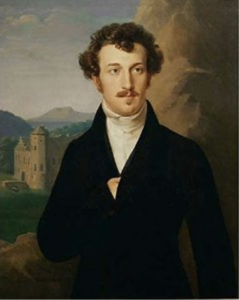Consolation in song
(Poet's title: Trost im Liede)
Set by Schubert:
D 546
[March 1817]
Braust des Unglücks Sturm empor,
Halt ich meine Harfe vor,
Schützen können Saiten nicht,
Die er leicht und schnell durchbricht;
Aber durch des Sanges Tor
Schlägt er milder an mein Ohr.
Sanfte Laute hör ich klingen,
Die mir in die Seele dringen,
Die mir auf des Wohllauts Schwingen
Wunderbare Tröstung bringen.
Und ob Klagen mir entschweben,
Ob ich still und schmerzlich weine,
Fühl ich mich doch so ergeben,
Dass ich fest und gläubig meine:
Es gehört zu meinem Leben,
Dass sich Schmerz und Freude eine.
Whenever a storm of misfortune roars up
I hold out my harp.
The strings cannot offer protection
Since it breaks through them easily and quickly;
But through the gateway of song
It strikes more softly on my ears.
I can hear a gentle lute resound,
Which goes deep into my soul,
Which lifts me onto the wings of harmony,
Bringing me miraculous consolation;
And whether I am emitting laments
Or I am crying silently and in pain,
I feel myself totally surrendering,
So much so that I believe this firmly and fervently:
An essential element of my life is
That pain and joy are fused in one.
All translations into English that appear on this website, unless otherwise stated, are by Malcolm Wren. You are free to use them on condition that you acknowledge Malcolm Wren as the translator and schubertsong.uk as the source. Unless otherwise stated, the comments and essays that appear after the texts and translations are by Malcolm Wren and are © Copyright.
☙
Themes and images in this text:
Breaking and shattering Doors and gates Ears Harmony Harps and Aeolian harps High, low and deep Joy Laments, elegies and mourning Lutes Noise and silence Pain Soothing and healing Songs (general) Soul Storms Stringed instruments (unspecified) Tears and crying Wings
Why do we sing and respond to singing when we hear it? For some people, song (and art in general) is simply a form of escapism, a means of blocking out the horror of real life. For others, though, it is a way of perceiving the true reality of the world we live in and a primary means of making sense of human experience. Yet, even those who hold the latter view will probably admit that Schober is right when he points out that music cannot hold back the ‘storms of misfortune’ and that it does not offer any form of protection when life is at its hardest. All that song can do is take the edge off the misery. The arts can help us cope and there is a chance that we will find consolation. Our suffering will be no less real (we might continue to cry out in pain or we might manage to keep the pain hidden inside) but it will take on a different character when we remember that agony can never be fully separated from joy. This is what we realise when we are ‘lifted up on the wings of harmony’. We are integrating the pain of real life as well as escaping from it.
Schober’s text should probably be read alongside ‘An die Musik‘, which Schubert set at the same time (D 547). March 1817 was a period when Schubert seems to have been interested in producing pairs of songs, involving texts by his close friends. He paired Mayrhofer’s ‘Memnon‘ with a Goethe song, ‘Ganymed‘: two classical figures expressing longing in response to a brilliant morning. Another Mayrhofer / Goethe pairing was ‘Am Strome‘ and ‘Auf dem See‘. Josef von Spaun wrote ‘Der Jüngling und der Tod‘ (which Schubert set to music immediately) as a companion to the Claudius’s ‘Der Tod und das Mädchen‘. Either Schober or Schubert must have had the idea that a single work on the nature of music was not enough. Although the pain and the joy are united, no one song can quite express them both.
☙
Original Spelling and note on the text Trost im Liede Braust des Unglücks Sturm empor: Halt' ich meine Harfe vor. Schützen können Saiten nicht, Die er leicht und schnell1 durchbricht; Aber durch des Sanges Thor Schlägt er milder an mein Ohr. Sanfte Laute hör ich klingen, Die mir in die Seele dringen, Die mir auf des Wohllauts Schwingen Wunderbare Tröstung bringen; Und ob Klagen mir entschweben, Ob ich still und schmerzlich weine, Fühl ich mich doch so ergeben, Daß ich fest und gläubig meine: Es gehört zu meinem Leben, Daß sich Schmerz und Freude eine. 1 When the poem was published in 1842 the wording was 'schnell und leicht'. Schubert would have worked from the author's manuscript; it is not possible to know if he made the change while setting the text or if the author revised it before publication.
Confirmed by Peter Rastl with Gedichte von Franz von Schober, Stuttgart und Tübingen, J.G.Cotta’scher Verlag, 1842, page 6; and with Huldigung den Frauen. Ein Taschenbuch für das Jahr 1832. Herausgegeben von J. F. Castelli. Zehnter Jahrgang. Wien bey Fr. Tendler, page 195.
To see an early edition of the text, go to page 6 [24 von 292] here: http://digital.onb.ac.at/OnbViewer/viewer.faces?doc=ABO_%2BZ20766660X


